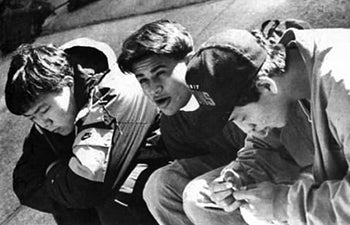Independence Days
When Akir Gutierrez ’95 was growing up on 37th Street and South Normandie Avenue in Los Angeles, he wasn’t aware of the formal relationship between achieving dreams and the power of visualization.
This much, though, he knew: If you stood in the middle of his street for a pickup game of baseball or football in the heat of the afternoon, you could make out the USC campus looming in the not-too-far-off distance.
“From our kitchen window,” he recalled, “you could actually see the globe atop VKC [the Von KleinSmid Center on campus].”
That proximity gave not just him, but his parents, a goal.
“We were the first generation of kids who were potentially going to go to college,” said Gutierrez, who would go on to graduate from USC Dornsife with a B.A. in international relations. “My parents, who were from Nicaragua, were part of that first wave of Central American immigration. And they always highlighted, ‘You are going to go to college.’ And they would always point to ’SC.”
Situated within one of LA’s most ethnically diverse urban neighborhoods, the campus wasn’t just a backdrop; it was an environment — and opportunity — that he and his friends interacted with weekly, if not daily. Playing in the old gym, using the old swimming pool, and getting a feel of the sweep of the environs, he recalled, made him feel part of something larger.

In his youth, Akir Gutierrez, center, and his friends often visited the USC campus from their nearby homes.
Fueling an independent spirit
His experience with USC — both as a child growing up within its shadow and later as a student — primed his sense of curiosity while helping to cultivate his sense of independence.
Back then, he sold programs with his siblings at the nearby Los Angeles Memorial Coliseum during football season. “There was this old, crotchety dude who stood on a mountain of programs,” he recalled. “Kids would come over and he would give them a stack of 10 and they would sell them for a quarter a piece. He’d split the proceeds with you when you brought back the $2.50. Back then you only needed three or four dollars to get the ticket, hot dog and a bag of P-Nuttles.”
Along with his deep curiosity and entrepreneurial spirit, Gutierrez exhibited early academic promise. He was a high-achieving pupil at Lenicia B. Weemes Elementary School in Los Angeles and won a scholarship to Harvard School (now Harvard-Westlake), a college prep school in the nearby San Fernando Valley.
“I always thought I would go into politics or the FBI or the CIA or something like that. I was taking Russian. It was during the Cold War,” he said.
When the time came to choose a course of study, “the universities would come to my school and describe the opportunities that they had on their campuses.” USC’s pitch felt less like a choice than destiny.
Familiar footing launches success
His return to campus as a student, even taking courses in VKC, “was actually like being home,” he said.
Just as knowing his way around campus had afforded unanticipated benefits, Gutierrez knew to look for the unexpected opportunities a USC education might provide. During the summer of his sophomore year, he was offered an internship at Trust Company of the West, working in client and fund reporting. When the internship ended, he was promptly offered a file-clerk position in the firm’s research department. That offer was the door to his career in finance.
By the spring of his senior year, said Gutierrez, “I started interviewing at a lot of investment banks and I was offered a role as sales assistant with Lehman Brothers. I graduated on a Friday and on the Tuesday after Memorial Day, I was up in San Francisco starting my new job.”
Lessons learned carry on
Gutierrez has been at Susquehanna Financial Group for five years and in his current role as director of research at the company’s Manhattan office for one. A married father of two, he explained, New York life suits the urban explorer still deep inside him — a spirit he now sees reflected in his own children.
“I think the biggest thing that is useful in any career — in life — is being inquisitive and not taking things at face value,” he explained. “In international relations I learned that you constantly had to question assumptions and look beyond the obvious and the surface.”
That openness and ability to see beyond perceived barriers still serves him. “I think the thing that most individuals lose sight of is the ability to connect. My professors [at USC] were just incredibly accessible. You could walk right in. All of the stereotypical stuff where you’re going to have coffee and discuss the subject matter with your professor? That stuff would happen. But that opportunity, I think, you can easily miss if you don’t avail yourself of it.”